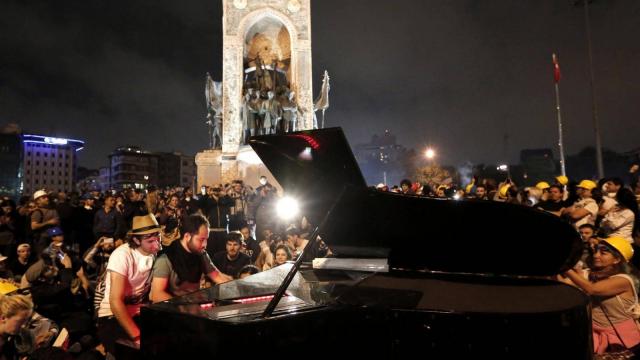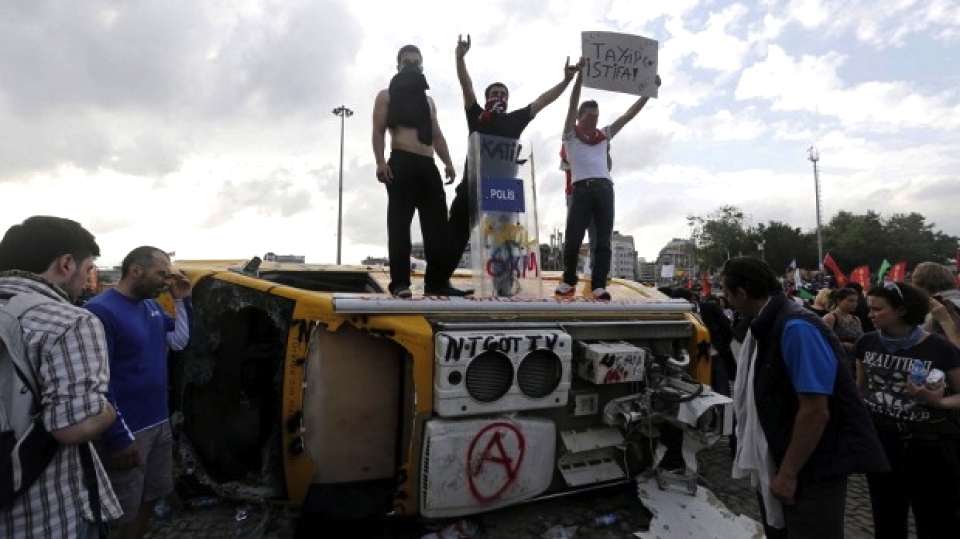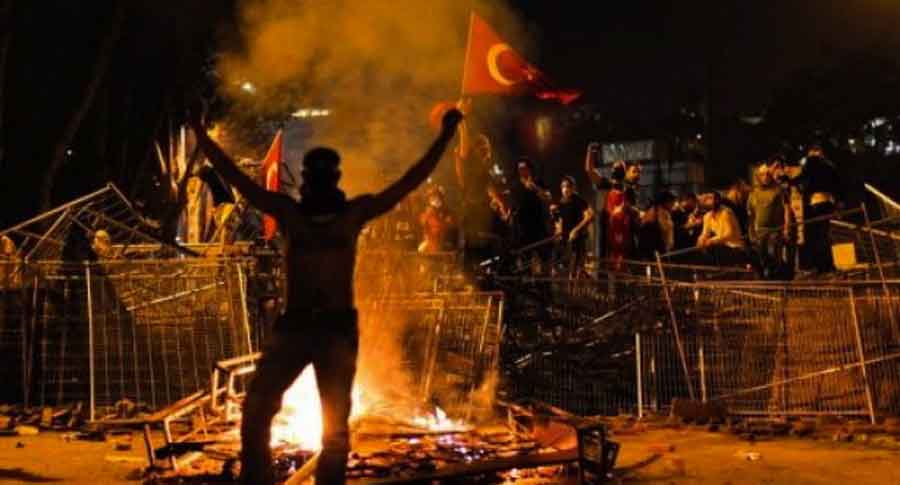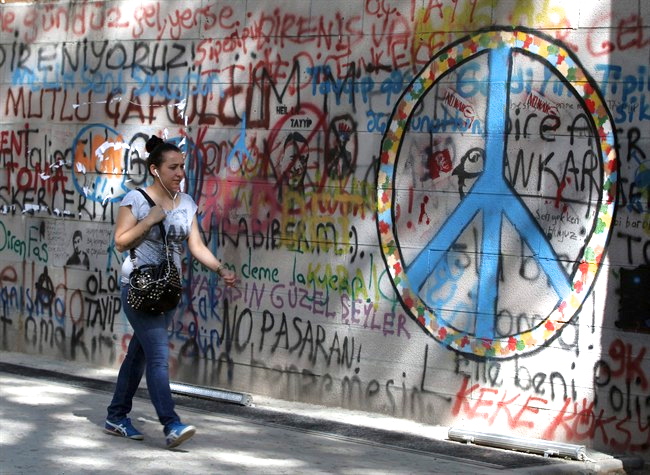
By now you will have seen pictures of police battles, burning tires, riot shields and tear-gas-stricken protesters. These images have become so familiar to us over the past few years that we are almost immune to them. But what you can't get from the pictures is the extraordinary transformation that took place in Taksim Square – the center of Istanbul – in the space of a mere 10 days. It became a living, breathing community of peace, love and hope. "Woodstock" people whispered as they strolled amongst the stalls of free food and books, and the forests of posters and red flags. Too beautiful to last. We all knew that.
The organization of the protesters has been impeccable: all over Gezi Park every inch of space is still covered by tents, blankets, tables laden with food, maps and information posts. Barricades block all the entrances so that only the trusted can enter. There is a library, a clinic, theater masks and gas masks and even a garden. In order not to allow the municipality with its large vans to collect rubbish, each morning the community has been organizing a roster of members to clean up the mess, passing bags along a human chain. Instead of the streams of relentless shoppers each caught in his own acquisitive world, people have felt free to engage one another in talk.
This movement which was so rudely shattered on Tuesday has historical precedents. The Young Turks were a diverse group of Turkish citizens who rebelled against Ottoman Sultan Abdul Hamid II and his extremely authoritarian government in the early 20th century. They are often credited with laying the groundwork for the modernization and ultimate demise of the Ottoman Empire. The association of the Young Turks with radical ideas and revolutionary change is so widespread that the term is often used in slang to refer to groups of youthful and politically active individuals who agitate for change.
Their origins lie in 1889, when an atmosphere of quiet dissent began to spread throughout the Ottoman Empire, primarily among students and disaffected members of the military. After a brief period of constitutional government from 1876-1878, the Sultan suspended the Turkish constitution, causing a great deal of unrest among many Ottoman citizens. The Young Turks began meeting in small cells to talk about the creation of a secular, constitutionally based government as an alternative to Turkey's existing monarchy, and the movement quickly spread until 1906, when the Young Turks came out in the open and began to actively agitate for change.
At times, it was a group whose passion was greater than its vision. It got rid of one sultan only to replace him with his aged brother who had been dragged into the limelight from the palace where he had been imprisoned by Abdul Hamid for 30 years. Imagine his terror when he heard the 101-gun salute, followed by relief at being crowned Mehmed V.
Mustafa Kemal Atatürk, the founder of modern, secular Turkey, played a minor role in the Young Turk revolution, and those who have visited Takism square over the course of the last week will have noticed many red flags bearing his image. Those known as the Kemalists often worship their leader blindly. But at Taksim the flag has above all served as a reminder of the cherished ideals that were being trampled by Recep Tayyip Erdoğan – chiefly the separation of state and religion. Turks are ready to gloss over the man's failings because he helped to bring the modern republic into being. Erdoğan resents the power the great father still holds over his people, and longs to find a comparable role.
What began as a protest against the demolition of one of the few remaining green spaces in Istanbul has become a beacon of radicalization for the whole country. Each night as dark falls, cities are alive with the banging of pots and pans. But there isn't a coherent plan, rather a cry of pain. The prime minister has reacted with fury because try as he might, he can't crush the social media. He has been defeated by tweets. And the police have over-reacted because for years they have been brought out in busloads whenever three people have gathered together, only to sit around for hours, chafing at the bit. At last they've had some real action.
For now the brief occupation of Taksim is over and soon the cars will be back after the blood has been scrubbed away and the debris removed. Erdoğan may show contempt for the capulcu but the bourse is suffering and potential investors are turning away. Those are things he can't ignore for long.
Also focusing on Istanbul this week, Marjorie Cohn of Jurist wrote about the brutal crackdown and attacks on Turkish lawyers amid the protests:
For nearly three weeks, thousands of protestors have gathered peacefully at Occupy Gezi in Taksim Square in Istanbul. Turkish police have unleashed a brutal crackdown, resulting in three confirmed deaths and nearly 5,000 injured. According to Turkish lawyer Kerem Gulay, a Fulbright Scholar and doctoral student at Cornell Law School, police tactics include excessive beatings with police batons and rifle handles, and the use of pepper spray and other chemicals, rubber bullets, and, allegedly, real bullets.
In order to provide a pretext for police aggression against peaceful protestors, undercover police officers, acting as agents provocateurs, threw Molotov cocktails Tuesday at police, after which police launched a vicious attack on protestors.
A broad coalition of groups courageously gathered in Taksim Square is protesting neoliberal governmental policies, including economic, agricultural and environmental policies, human rights abuses, mass detentions, privatization of water resources, attacks on freedom of the press and on freedom of religion, and the treatment of Kurdish citizens of Turkey. The protestors' politics range from moderate to center right to nationalist to left liberal to extreme leftist. "All these people have in common," Gulay told me, "is they are critical of government policies."
When lawyers were issuing a press statement decrying the mass detentions of their clients, some 50 lawyers were arrested and dragged on the ground by riot police. Many lawyers were injured before they were released 10 hours later. Nearly 3,000 lawyers gathered at the courthouse Tuesday to protest these detentions.
There is an ongoing and dangerous process of criminalization of lawyers in Turkey. Nine of fifteen lawyers arrested on January 18, 2013, for representing unpopular clients, remain in custody without charges or access to legal papers about their cases. On that date, police raided the Istanbul and Ankara offices of the Progressive Lawyers Association (CHD), a member organization of the International Association of Democratic Lawyers (IADL). Twelve CHD officers or members were violently detained under vague terrorism-related allegations. They were interrogated about their representation of clients. They were denied water and the use of a bathroom.
These arrests, detentions, and seizure of property—including confidential client files—violate the International Covenant on Civil and Political Rights. The cases are pending in the Special Heavy Penal Courts, which have jurisdiction over "terrorism" proceedings. Their use of secret evidence and repressive procedures have been condemned by several international and regional human rights monitoring bodies and mechanisms. The United Nations Special Rapporteur on the Independence of Judges and Lawyers, Gabriela Knaul, who recently visited Turkey, strongly criticized the Special Heavy Penal Courts, saying their "special authority" does not comply with human rights standards on fair trial, and they should therefore be abolished.
A group of 500 lawyers who went to the courthouse to protest the lawyers' detention in January were assaulted by police. The Istanbul Bar Association lambasted the unlawful raids as an "explicit attack towards the legal profession and its honor, as well as the people's right to legal remedies."
When I visited Istanbul as a representative of IADL in April, I met with officers of the Istanbul Bar Association, and I spoke with lawyers who had been arrested and released after the January raid. Some are members of CHD. Many specialize in defending victims of torture, arbitrary detention, extrajudicial executions, police brutality and other human rights violations. They also provide free legal assistance in terrorism-related cases, and those involving freedom of expression or protection of the environment. Because of their work in defending clients who challenge government policies, CHD lawyers have been targeted by the government and the police.
Knual also reaffirmed the principle that a government should not identify lawyers with the causes of their clients. The United Nations Basic Principles on the Role of Lawyers mandate that governments ensure lawyers are able to perform their professional functions without intimidation, hindrance, harassment or improper interference. They also provide that lawyers shall not be identified with their clients or their clients' causes as a result of discharging their functions.
The president of the Istanbul Bar Association has been accused of contempt of court for protesting the January detentions of lawyers. According to the 2010 US State Department country report on Turkey, there are more than 10,000 people suspected of "terrorism" in Turkey (one-third of the world's terrorism suspects). Several hundred students, as well as army officials, journalists, lawyers, academics, Kurdish activists, nationalist activists, soldiers and members of the Turkish parliament are in prison, Gulay said.
Frequent and systematic repression against political and human rights activists in Turkey, particularly lawyers and journalists, has been well documented. This year alone, representatives of IADL witnessed evidence of the Turkish state's enforcement of broad and oppressive laws to suppress political dissent from journalists, lawyers, trade unionists and citizens.
The Turkish government must immediately halt all police repression against Turkey's protestors, including police beatings, the use of tear gas and other chemicals; release all detained protesters who were expressing their fundamental right to freedom of expression; and launch an immediate investigation into the human rights abuses committed against the Turkish people since the beginning of the protests, including an investigation into the unlawful use of tear gas and other chemicals.
Taksim Solidarity, the group that was organized before the recent demonstrations to stop the notorious Taksim project of the government, and which has become the voice of the resistance, has declared June 13 International Day of Solidarity with the resisting people in Turkey. Taksim Solidarity invites progressive people around the world to condemn the police violence carried out by the direct order of the government and to show their solidarity. CHD has also issued a call for international solidarity and asks lawyers organizations and human rights organizations to express their concerns to the Turkish government and state bodies. IADL calls upon people throughout the world to join us in demanding an end to the violence against Turkish protestors and accountability.
3 WAYS TO SHOW YOUR SUPPORT
- Log in to post comments


















